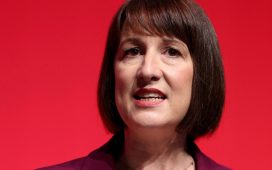When U.K. custom electric car creator RBW showed off its Roadster and GT models at Monterey Car Week this year, the vehicles stunned a lot of attendees, CEO Peter Swain recently told TechCrunch.
“We had four ‘wows,’ where people would go: ‘Wow, that’s beautiful. Wow, look at the interior. Wow, is it really brand new?’ And then they go: ‘Wow, is that all that costs?’” he said.
That might seem like a strange reaction to cars that start at $139,000. But Swain contends the price tag is competitive compared to the many EV conversions that are happening around the world. And since his company is building these new, from the ground up, he thinks it’s a bargain compared to other custom builds.
“We’re not extortionate, for a hand-built vehicle,” he said.
Now, Swain and his team at RBW are starting a new effort to please more of those people who’ve said “wow” over the last few years.
On Thursday, they’re launching a company called Spirit EV. It’s a design, testing, and production company that describes itself as EV-as-a-service, with an artisan approach.
The idea is to take all the things they’ve learned in creating the RBW cars over the last few years and make that expertise available to other companies that want to build new, custom electric cars with classic styling. Dedicated sports or classic car builders who want to develop an EV can tap Spirit for help with specific components. Or if they want, they can outsource an entire design to Spirit.
It’s a business Swain said other companies have essentially been begging him to operate as he and his team developed the RBW cars. Swain said he’s always “had to say no, we’re too busy bringing our product to market,” noting it took “five years and 1,874 quality documents.”
Now, he said, he can take the work RBW was doing and apply it at greater scale. “I’ve spent 18 million bucks to get where I am, not just because we love our little sports cars, but we know the systems business,” he said.
While Spirit is based in the U.K. and will operate there, the group is also incorporating in the U.S. and plans to open a factory in Danville, Virginia by February 2025. The effort is funded with $6 million from Meson Capital Partners.
It’s an idea that’s possible because the push to go electric has driven down the cost of batteries, motors, and other components, Meson Captial president (and RBW chairman) Ryan Morris told TechCrunch. That, mixed with the engineering and sourcing work RBW has done over the last few years, is why he believes Spirit would only need around $20 million of investment to reach profitability — something he expects could happen out the gate in 2025.
“If you look at an auto restoration shop that does a dozen cars per year, and they’re buying, like, a single part in the aftermarket for every build they do, our costs are going to be way lower than that because we’re buying hundreds of components,” he said.
Beyond cost, Morris said a key difference between Spirit’s approach and classic conversions is that the latter still requires a lot of care and upkeep. Building a classic-style car from the ground up theoretically means an owner won’t have to worry so much about maintenance — which in turn expands the market of potential buyers.
“I’ve got two kids, I work a lot, I’m busy. I don’t have time to fix my car every third time I drive it,” he said. “It’s like when people watch old movies, and they romanticize the past — but then if you actually were in the past, it’s like, ‘oh the toilet paper was worse.’ The cars broke down all the time. There are so many little things that we take for granted.”
Spirit’s approach also means these classic-looking cars will have modern safety and convenience features, including Apple CarPlay.
Swain, meanwhile, is a believer not just because of the attention and success he’s found with RBW, but also because he’s hired people who’ve been working on EVs for longer than almost anyone else. In particular, he has a few workers leading the charge who spent time developing some of the earliest, most frustrating modern EVs.
For years, automakers dragged their feet on seriously developing electric vehicles. If they developed them at all, they were often denigrated as “compliance cars” — good enough to please regulators, but limited by the available technology and a depressing option for most consumers.
Neil Heslington, who’s leading development for Spirit, worked on some of these cars, including the Smart EV for Daimler in 2008. But while the OEMs (original equipment manufacturers) viewed them as “painful exercises,” he told TechCrunch those projects are directly informing the work at Spirit.
“We learned an awful lot of how we could do a small project to OEM standards, so that it was acceptable to go on the road, but with lower budgets and less time,” Heslington told TechCrunch in an interview.
Swain is confident in the idea, but he’s aware that with Spirit, his team is wading deeper into uncertainty than they have with RBW.
“We’re in a new market, which we’ve created. It’s pretty unique — brand new, classic EV cars,” he said. “But where’s it going to go? Let’s be honest, we don’t know exactly. We think we know, because we’ve got people who already want the system, and we’ve sold over 300 cars, and we’ve got a big waiting list. So the signs are good. We’ve just got to keep pushing forward.”








